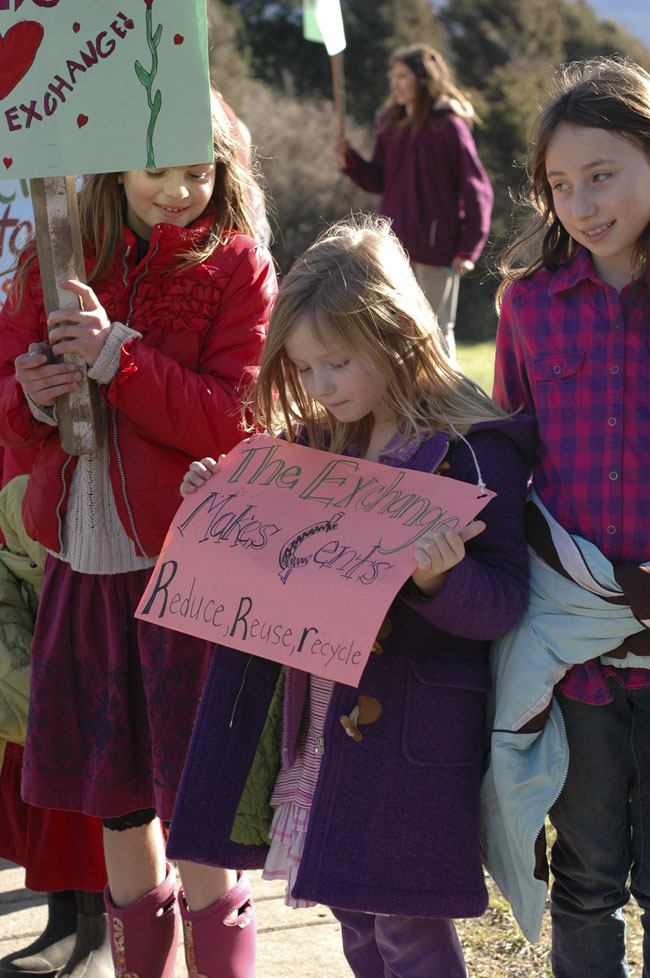The future of Orcas Island’s Exchange is still up in the air after a council meeting last week.
The county’s solid waste system is about to get a major overhaul following the Nov. 8 election. Voters rejected a proposal to establish a parcel fee to help fund the financially troubled county solid waste operations. The county will no longer run the solid waste facilities on San Juan, Orcas and Lopez Islands; instead all trash and recycle will be picked up at the roadside. What this means for the Exchange, an organization that allows islanders to both donate and pick up reusable items like clothes, books, and tools, is unclear.
During the council meeting on Feb. 7, council chairwoman Patty Miller, Orcas East, said there is no update to the solid waste after Tuesday’s meeting, but that there is a “concept” for dividing the property into areas, which includes setting aside a portion of the site for continuing the Exchange and possibly accommodating expansion, but there is significant due diligence that needs to be completed before any more specifics can be determined.
Islanders holding signs and voicing support of the Exchange gathered at Waterfront Park prior to the meeting. Members of the group KELP were also on hand to encourage a litter-free island.
George Post, board president of the Orcas Recycling Service, told the council, “Please do no harm, don’t screw it up, this is the first time ever to have an option for a better system.”
Post founded the Exchange 27 years ago. He had no complaint about the county potentially expanding it, as it creates the possibility for organization to grow. What does concern Post is that The Exchange may be competing with the private vendor that takes over operations.
“Our motive is to use everything on the island by recycling or using it as a resource,” said Post, who doesn’t want to see a lack of self-haul cause more people to haul garbage and recyclables off island.
Miller said the county council has already agreed on some minimal requirements for any entity that wishes to operate the facility, including requirements to carry insurance appropriate for the operation, obtaining and maintaining all required permits and that the facility be open to the public and that it offer solid waste services.
The council will also have “selection criteria,” which will be discussed a special meeting in Friday Harbor, Tuesday, Feb. 28, 9:30 a.m.
As far as the possibility of the Exchange having to worry about competition, Miller said, “There is no way to predict if any new businesses may evolve on Orcas. There are no plans at the county solid waste facility to issue an RPF for the Exchange ‘parcel.’ The goal is to work with the board of the Exchange to put in place an agreement for their continued operation as a nonprofit.”
The county has not yet issued the request for proposal for potential companies to take over the Orcas site. The Orcas Recycling Service Board is working with potential vendors in an effort to work out a collaboration.
“I’m optimistic,” Post said.
Salmonberry students get active
Salmonberry Elementary School students have launched a community-based civics curriculum that has recently brought them directly into the public spotlight.
These 13 students, age 8-11, have followed their own curiosity about some of the current issues on Orcas Island and begun to explore some of the questions with which the adult community has been grappling: solid waste, bike and pedestrian safety, proposed Fern Street Extension, and various issues related to handicap accessibility in Eastsound.
On a recent walk through Eastsound, students noticed a profusion of litter. They looked for the nearest trash receptacles only to realize that there were no public cans to be found. This led to research. They learned about the cost of solid waste pickup and they began to devise a plan. Students formed a new organization they are calling K.E.L.P. (Kids for the Environment through Litter Prevention.)
Through this organization, and in partnership with members of the Eastsound Planning and Review Committee, these young activists formulated a plan. They would pledge to raise the funds necessary to pay for one week of garbage collection for six new cans in Eastsound. Then they would talk to people and try to build partnerships o see if they could fin enough partners to fun a full year’s trash collection.
They also took advantage of the Feb. 7 meeting of the San Juan County Council. Ethan White, 11 and Charlie Brady 9, accompanied by their teacher Paul Freedman, spoke at the council meeting on Orcas. They read a letter explaining the nature of the problem as they see it, as well as their proposed solutions.
Later in the day, all the Salmonberry elementary students participated in a community-wide rally in support of The Exchange. Future projects include building bike racks in Eastsound, and borrowing wheelchairs and walkers to explore the town of Eastsound with limited mobility.
Any individual or organization who is interested in pledging financial support to K.E.L.P.’s project to bring trash and recycling receptacles back to Eastsound may contact Paul Freedman at info@salmonberryschool.org or 376-6310.



